By Conor Morris
Across the U.S., the cost of water and sewer has only gotten more expensive over the last several decades, with the average water bill increasing by 30% between 2012 and 2019, according to a utility bill index conducted by Bluefield Research.
As of 2019, low-income households spent an average of almost 10% of their disposable income each month to pay for basic monthly water and sewer services, according to a study out of Texas A&M University.
And in both Cleveland and Philadelphia, the pandemic and the cities’ high poverty rates mean there are thousands of people behind on their water bills.
As of November 2021, almost 10% of all Cleveland Water customers – about 40,000 customers – were behind on their water and sewer bills by six months or more, a rate that’s far higher than non-pandemic years. More than 1 in 4 Cleveland Water customers were behind on at least one bill that month, and in Philadelphia, nearly a third of customers were at least one bill behind in March 2021.
Despite a significant difference in population size, the city of Cleveland isn’t so different from Philadelphia. The water systems that serve both cities are municipality-owned and serve a wide geographic area, with the Cleveland Water Department servicing about 440,000 accounts and the Philadelphia Water Department servicing almost 500,000.
Crystal M.C. Davis, vice president of policy and strategic engagement for the nonprofit Alliance for the Great Lakes, said her agency commissioned a study of water and sewer rates across Ohio in 2019, and found that the key issue at play was not necessarily how expensive water prices have become, but rather, one of income inequality. For some people who are struggling to make ends meet, water is always going to be unaffordable – and will become more unaffordable as rates increase and wages remain stagnant.
Meanwhile, the city of Cleveland and others cities like it continue to put liens on people’s homes for past-due water bills, a practice which disproportionately impacts people of color, according to a report from the NAACP’s Legal Defense Fund. The city of Cleveland still faces a lawsuit in federal court over those practices.

